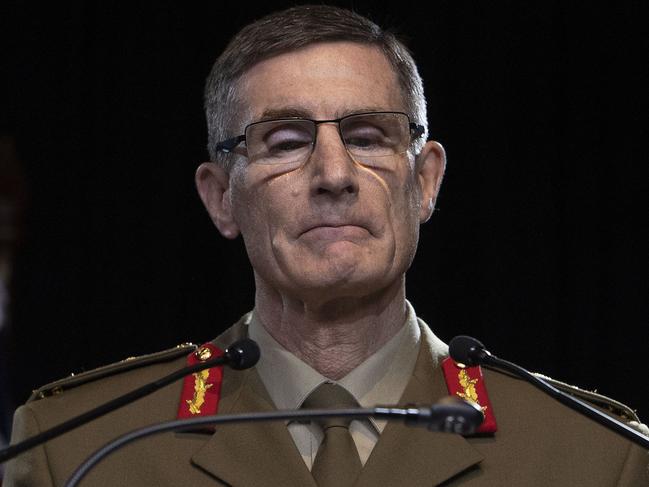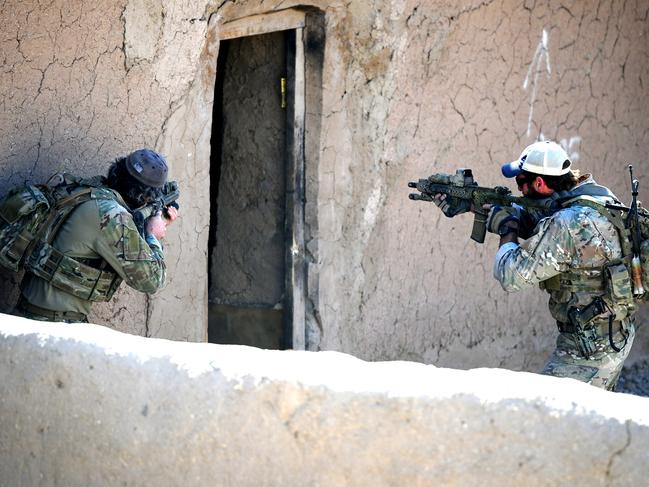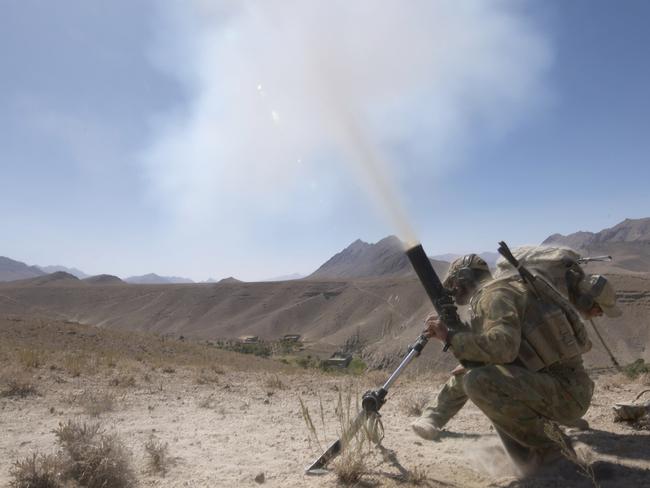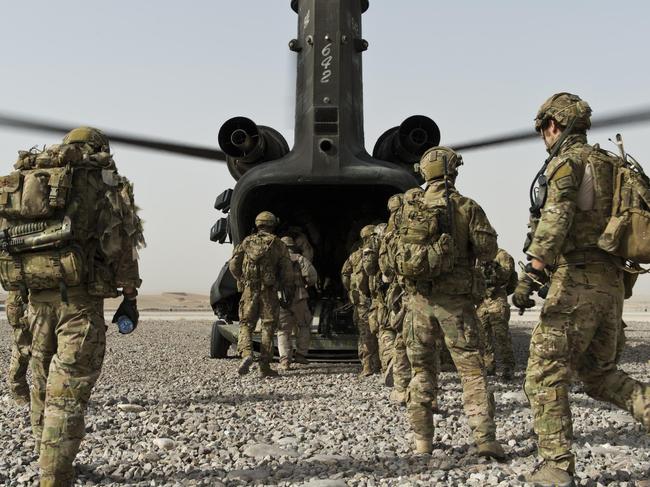Australian war crimes inquiry: What happens next
The damning report into the actions of some of Australia’s most elite soldiers is set to see sweeping Army reforms and lead to potential criminal trials.
National
Don't miss out on the headlines from National. Followed categories will be added to My News.
Sweeping top-level-down reforms to the Army including to its “Order of Battle” and the disbanding of a whole squadron, will be accelerated in the fallout from the inquiry into our elite forces.
Chief of the Defence Force General Angus Campbell conceded he was aghast at the extent of allegations he had read in the Brereton report in the past fortnight.
But equally damning has been the “warrior culture” that had been allowed to flourish in the ranks of our elite troops which became almost too elite for the rest of the Army and allowed to run its own show.
Gen Campbell said he particularly believed there were “many, many people” across all levels of his troops involved in Afghanistan operations that now most wonder what “they didn’t see, walked past or appreciate” to prevent this disgrace.
“And I think it will carry in the consciousness of a generation,” he added solemnly.

This was no longer going to be allowed to occur with reforms at the operations command level already underway focusing on “ethical leadership, good governance and command responsibility”.
“While much good progress has been made, the report notes that elements of resistance to change and professionally corrosive attitudes or behaviours persist,” he warned, adding the report gave impetus to accelerate change specifically to the Special Operations Command (SOCOMD) that was only established in 2003 in a bid to unite all Australia’s Special Forces.
According to evidence it quickly earned the moniker “federation of fiefdoms” due to its fractured and corrosive nature and rivalry between its two biggest components SASR and 2 Commando Regiment.
It was “East versus West attitudes” where the two commands are geographically located in Australia, the SAS based in Perth and Commandos based in eastern states.
Cross postings have now been recommended to breakdown that destructive rivalry, despite the upheaval to defence families this may cause.
The report particularly noted the Sydney-based 2 Commando were not involved in a pattern of behaviour but then the inquiry struggled in “breaching the code of silence” of the regiment.
ADF is also to revise command and control arrangements and SOCOMD governance with independent operational oversight and protocols to better integrate it back into Army.
The length of deployments will also change with a review underway into what is an optimum time for a soldier to be out in the field with successive rotations seeing a “deterioration of moral standards”.
The 2 ‘Sabre’ Squadron SASR will also be disbanded; it was raised in 1964 as part of the SAS’s expansion.
It will no longer exist and a black stain to remain on its name with a new squadron to be raised.

Comprehensive details of the changes to the “Order of Battle” have yet to be revealed but in military speak the term itself means “the identification, strength, command structure, and disposition of the personnel, units, and equipment of any military force.”
Gen Campbell said “lies” were told and efforts made by some to ensure the misdeeds by others were not discovered by senior officers in the command.
“In terms of knowing, I think Justice Brereton indicates in his report, quite an effort to ensure people did not know which is in itself a damning statement for command, at many levels,” he said.
He added: “Those who wished to speak up were allegedly discouraged, intimidated and discredited.”
Reforms had been taking place incrementally since first reports were raised in 2015 and early reviews performed, notably by former ASIO boss David Irvine.

Chief of Army and special forces soldier Rick Burr said the report was “disturbing and extremely serious” that would affect the whole military and he was committed to restoring trust in Australia’s military with Australia’s public.
“We will emerge as a stronger more capable and effective army,” he said in a Facebook address.
In terms of what should happen to those who failed in their command duties, Gen Campbell said “all options are on the table” as he hinted the inquiry and reforms were far from over.
He said the “moral authority” as a military force had been damaged but was not a mortal wound and he hoped the reforms announced would heal and unite.
“I respectfully ask Australians to remember and have faith in the service of the many. Let me assure you, I do,” he said.
Gen Campbell singled out former Special Operations Commander Australia from 2014 until his retirement in 2017 General Jeff Sengelman who raised all the concerns in 2015.
Between 2005 to 2016, the period within the Brereton investigation remit, more than 26,000 Australians served in Afghanistan, 3000 of them in the Special Operations Task Group.
HOW ANY TRIAL WOULD PROCEED
Potential criminal trials are expected to be held in the Supreme Court as opposed to a closed-door military tribunal if the incidents are deemed war crimes, legal experts have said.
But whichever route, it will be years before anyone is brought to justice with the Brereton inquiry just providing the avenue toward prosecution not the evidence for trial.
The way the Inspector General ADF (IGADF) inquiry was established, its findings cannot be used for further disciplinary action and can only point to where Australian Federal Police investigators should look.
As announced by Prime Minister Scott Morrison, the newly created Office of the Special Investigator will be tasked with following up on this.
In short, its burden of proof has a lower threshold than that required for actual criminal prosecutions.
Also complicating the matter is those Special Forces soldiers who gave inquiry evidence, and there were more than 300 of them, were given protection from criminal and civil liability and its yet too early to know whether those protections will be extended to an actual trial.
University of Melbourne Law School deputy dean and military law expert Alison Duxbury confirmed there were two avenues for the Brereton legal fallout, depending on severity of each allegation and what the Special Investigator will later find.

But she said it was likely to be very public if some allegations are deemed war crimes as opposed to a straight murder charge.
“What they choose could be based on type of crimes alleged and whether it’s deemed to be a war crime or a murder,” she told News Corp Australia.
“Given the amount of public interest that there has been in this particular report, these allegations and the way the prime minister has come out … and because of the seriousness of the matter I think there might be a preference that this is tried in a civilian court,” she said.
Some of the more obvious failures would go before a military tribunal but the Supreme Court was likely the platform for others.
Prof Duxbury said this was a unique situation, the extent of the alleged crimes Australia has not faced before and there could be difficulties bringing it to court.
“Think about the complexity in a murder trial in jurisdictions within Australia then think about a jurisdiction where witnesses could be overseas who obviously need to be located, evidence taken … justice could take a long time, that is not a reason why you wouldn’t pursue obviously because murder cases do take a long time, but yes this could take a long time.”
A war crime can be a wilful killing, torture, inhumane treatment, attacking civilians and mutilation under section 268 of the Commonwealth Criminal Code.
Support services:
· The Defence all-hours Support Line is a confidential telephone and online service for ADF members and their families 1800 628 036
· Open Arms provides 24-hour free and confidential counselling and support for current and former ADF members and their families 1800 011 046, or through SafeZone on 1800 142 072.
Crisis support from Lifeline is available on 13 11 14
MORE NEWS
25 Australian elite soldiers linked to murder of 39 civilians
3000 soldiers could lose medals
Actions of few endangering others
Five words Australia’s military must use right now


